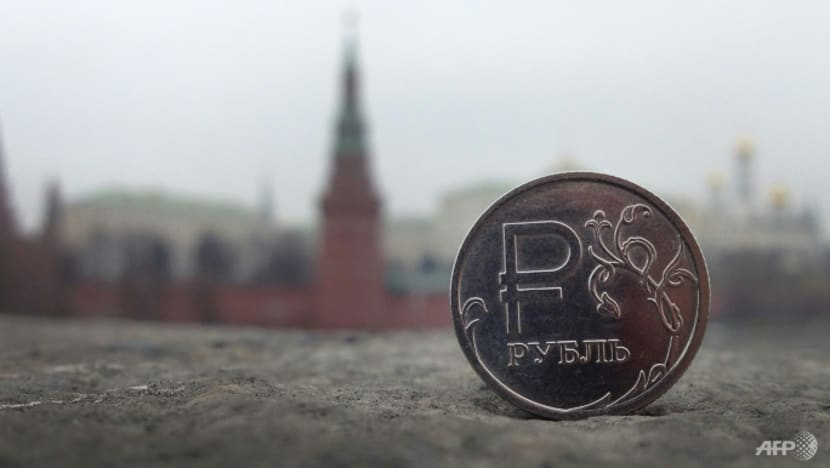Why China's payment system can't easily save Russian banks cut off from SWIFT

Exclusion from the SWIFT banking network would make it difficult for Russia to trade with the rest of the world. (Photo: AFP/File/ALEXANDER NEMENOV)
Western nations have sought to punish Russia for invading Ukraine by imposing economic and financial sanctions and excluding some Russian banks from the omnipresent SWIFT messaging system, known as the Gmail of global banking.
That’s raised questions about whether China - which before the war signalled it wanted closer ties with Russia - could offer its neighbour a financial lifeline.
In particular, many have focused on what a Chinese payment system, known as CIPS, could do. The answer seems to be not much, for now.
WHAT IS CIPS?
The Cross-Border Interbank Payment System was set up in October 2015 as a settlement and payment clearing system for transactions that use the yuan, also known as the renminbi, or “people’s currency.”
The system is supervised by China’s central bank but is run by CIPS Co Ltd in Shanghai. Ownership is spread among dozens of shareholders including state-owned Chinese financial institutions, exchanges and Western banks.
Its use has steadily increased, with an average daily transaction value of 388.8 billion yuan (US$61.3 billion) as of February, about a 50 per cent increase from a year ago, according to data from the company.
IS IT A RIVAL TO SWIFT?
They’re not direct competitors. Whereas SWIFT is a messaging system for global banks to communicate, CIPS is mainly a settlement system for renminbi transactions that also offers some communication functions.
Most banks that use CIPS still communicate via SWIFT, either out of habit or because they don’t have the CIPS-specific messaging tool installed, or both, according to the Cross-Border Finance Research Institution, a Shanghai-based consultancy.
The People’s Bank of China last year actually set up a joint venture with SWIFT to offer local network services and store message information in China.
By size, CIPS is miniscule compared to SWIFT, which has more than 11,000 members and handles more than 42 million transactions a day. As of February, CIPS had about 1,300 participants, primarily in China, and processed about 13,000 transactions a day.
Related:
WHAT ABOUT CHIPS?
That might be a better comparison, although it handles a lot more money. CHIPS, or the Clearing House Interbank Payments System, is the largest privately owned US dollar clearing system, according to its website.
It handles about US$1.8 trillion in payments a day - almost 30 times the daily transaction value for CIPS.
WHY WAS CIPS CREATED?
It’s part of China’s strategy to encourage global usage of the renminbi, which remains small compared to the size of China’s economy. The yuan was only about 3.2 per cent of global transactions in January, according to SWIFT.
It’s also seen as a way China is seeking to decrease its dependence on the Western financial system and use of the dollar, especially after the US extended economic sanctions on Iran in 2010 and then sanctioned Russia for its invasion of Crimea in 2014.
COULD CIPS BE USED TO BYPASS WESTERN SANCTIONS?
It would only work if the transactions are in renminbi - likely only when Russia and China are settling direct trades - and both parties were CIPS members.
Such payments remain small: They increased to around 6 per cent of transactions in 2020, compared to 2 per cent in 2013. In reality, even as the two countries have sought to move away from using the dollar in trade, that’s meant largely switching over the euro - which is also now sanctioned.
And there are other issues:
- It’s unclear to what extent non-Chinese importers or exporters that do business with Russia would be willing to accept payment in renminbi.
- For CIPS to be of any help to Russia in skirting the US financial system, Russia would have to be part of a renminbi-centric financial system. That seems unlikely given China’s capital controls on its currency, which restrict the flow of funds in and out of the country.
WHAT'S CHINA'S POSITION?
China hasn’t joined western countries in sanctioning Russia and has vowed to continue normal trade relations with Russia, which is seen as a strategic partner.
But US Treasury Secretary Janet Yellen said in a Mar 10 CNBC interview that she hadn’t seen “evidence that China is providing Russia with any significant workaround for our sanctions.”
It’s unlikely that China’s largest state-owned banks would seek to bypass Western sanctions, considering that their international operations require access to dollar transactions, which could be cut off if they were caught via so-called secondary sanctions.
Two of the biggest, Industrial & Commercial Bank of China Ltd and Bank of China Ltd, have already restricted financing for purchases of Russian commodities, especially in dollars.
ARE THERE OTHER WAYS CHINA COULD HELP RUSSIA?
Some Russian lenders are looking to start using China’s UnionPay system for credit cards after Visa Inc and Mastercard Inc suspended operations in Russia.
That could allow Russians to make some payments overseas, with UnionPay operating in 180 countries and regions. Other potential avenues include:
- About 13 per cent of Russia’s reserves, or an estimated US$77 billion, were in Chinese assets as of June 2021, the most recent figures from the Bank of Russia. Selling off those holdings would give Russia much-needed liquidity.
- China’s central bank has a multi-billion dollar currency swap with Russia’s central bank, potentially allowing the two nations to provide liquidity to businesses so they could continue trading.
- Smaller Chinese banks that don’t have international operations could also continue to do business with Russia; they would have less to lose if they were hit with secondary sanctions from western nations.
- A research note from Natixis noted that China’s nascent digital yuan is unlikely to be of much use because it “does not yet offer cross-border transactions of any relevance, and Russia has not yet signed up” to use it.














